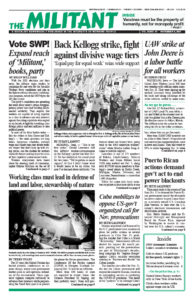November 11, 1996
NEW DELHI, India — Some 1 million telecommunications and postal (P&T) workers here launched a nationwide strike over a wage dispute October 23. A week later, the walkout remained solid, having shut down most postal services, telephone line repairs, and the sending of telegrams.
Thousands of workers have staged protest rallies and set up picket lines outside post offices and telecommunication centers in New Delhi since the walkout began. Unionists have burned effigies of the communications minister, a social democrat, who declared the strike illegal. The workers are demanding the government abolish a ceiling on annual productivity bonuses to P&T employees. Many workers depend on these bonuses to supplement low wages.
The government conceded the strike is near total in both postal and telephone services. The telecommunications ministry has sought to bring troops to act as strikebreakers.
November 12, 1971
On Aug. 15, the Nixon administration launched the 90-day wage freeze, followed by the creation of a special Pay Board whose function is to drive down real wages. The major targets are the powerful industrial unions, whose contracts for wage increases must now be approved in advance by the Pay Board.
What can the labor movement do? There is only one force on which the workers can rely: their own power to mobilize mass independent struggles against the employers and the government. The unions should establish their own political party, responsible to the labor movement.
The 1972 elections will offer the first opportunity to use the electoral arena nationwide to respond to Nixon’s attack. The candidates of the Socialist Workers Party are campaigning in support of independent political action by labor, and those who agree should join in.
November 9, 1946
Big real estate sharks are moving to rip the ceilings off rents and add billions of dollars to the cost of living of the American people. The wealthy real estate interests are hammering at the Truman administration for “justice and emergency relief” for the “poor” landlords who are raking in 40 percent more than before the war.
The landlords are in this position to put the squeeze on the workers because the government has failed to relieve the housing shortage by a full-scale program of government low-rent housing construction. Opposition of the real estate interests to government “competition” is behind the government’s housing failure.
So-called “landlord strikes” are spreading throughout the west coast and moving east. The landlords are conducting an organized refusal to rent vacancies, while millions are in dire need of housing.

